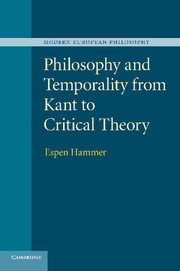Book contents
- Frontmatter
- Contents
- Acknowledgments
- Introduction
- 1 The historicity of time
- 2 Modern temporality
- 3 Two responses to the time of modernity
- 4 Hegel's temporalization of the absolute
- 5 Schopenhauer and transcendence
- 6 Time and myth in the early Nietzsche
- 7 Recurrence and authenticity: the later Nietzsche on time
- 8 Heidegger on boredom and modernity
- 9 A modernist critique of postmodern temporality
- Conclusion
- Bibliography
- Index
5 - Schopenhauer and transcendence
Published online by Cambridge University Press: 21 April 2011
- Frontmatter
- Contents
- Acknowledgments
- Introduction
- 1 The historicity of time
- 2 Modern temporality
- 3 Two responses to the time of modernity
- 4 Hegel's temporalization of the absolute
- 5 Schopenhauer and transcendence
- 6 Time and myth in the early Nietzsche
- 7 Recurrence and authenticity: the later Nietzsche on time
- 8 Heidegger on boredom and modernity
- 9 A modernist critique of postmodern temporality
- Conclusion
- Bibliography
- Index
Summary
Despite its consistently brilliant style, The World as Will and Representation is an unwieldy and often challenging book: by turns lyrical, acerbically insightful, and cynically dismissive, with its repertoire of philosophical concepts drawn mainly from Kant yet with forays into Hinduism and Platonism, it places vivid psychological realism at the service of a project that is unashamedly metaphysical in nature. Unlike his great contemporary Hegel, whose work he ferociously despised, Schopenhauer's recognition did not take place until well after his own death, and his readership has tended to be of an aesthetic and literary rather than narrowly philosophical bent. That should not, however, be taken to imply that his contribution to philosophy has been slight; on the contrary, Schopenhauer's work has exerted an extraordinary impact upon subsequent developments in European philosophy. His debunking of intellect in favor of will set the early Nietzsche off on his course, and via Eduard von Hartmann, a popular Schopenhauerian thinker of the late nineteenth century, exerted a profound influence on Sigmund Freud. Max Horkheimer and Theodor W. Adorno adopted aspects of his critique of Hegel as well as his emphasis on human suffering and finitude. Through the works of figures such as Richard Wagner, Marcel Proust, Thomas Mann, and Samuel Beckett, his importance for literary and musicological thought has been considerable.
As a philosopher of time, Schopenhauer sees human existence as tragically finite and life essentially as a prolonged process of dying, oscillating between dissatisfaction and boredom.
- Type
- Chapter
- Information
- Philosophy and Temporality from Kant to Critical Theory , pp. 97 - 124Publisher: Cambridge University PressPrint publication year: 2011

